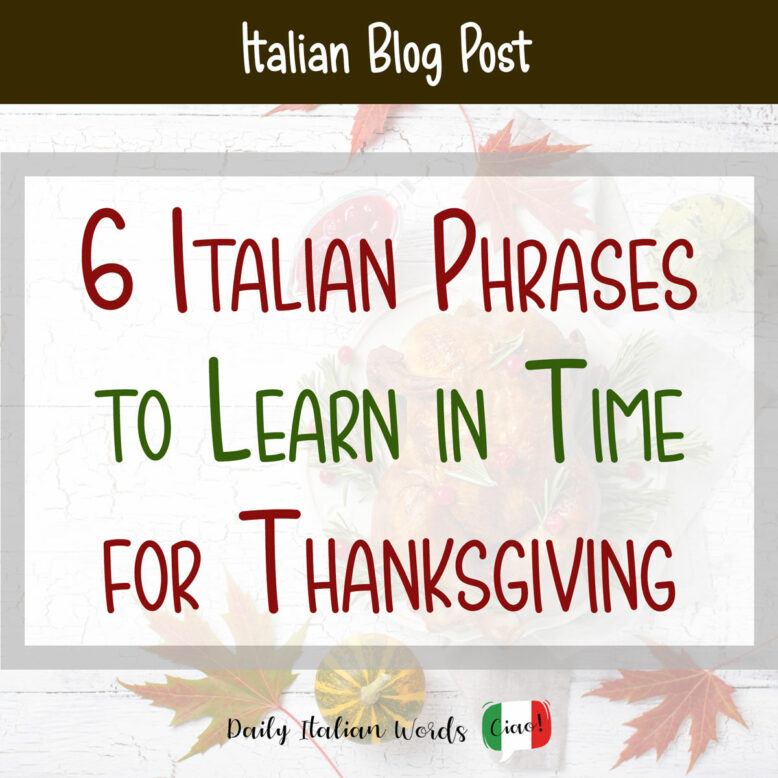We all know that Italians in Italy do not celebrate Thanksgiving (il Giorno del Ringraziamento). However, the same cannot be said for the millions of Italian Americans and Canadians who have embraced the holiday wholeheartedly and turned it into their own.
If you are an Italian living in the United States, or an American who is passionate about the Italian language, you may be interested in learning a few Thanksgiving phrases in Italian to impress your relatives around the dinner table. Here are six you might enjoy!

1. Sono grato. / Sono grata.
One of the most important phrases people use at Thanksgiving is “I am grateful / thankful” which in Italian translates as Sono grato for those who identify as male, and Sono grata for females.
Sono grato. / Sono grata.
I’m grateful.
If you want to say that you are “grateful for X”, then you can use the constructions Sono grato per [something] or Sono grato a [person].
- Sono grato per la vita che ho avuto. = I’m grateful for the life I’ve had.
- Sono grato a mia moglie. = I am thankful for my wife.
When an indirect object pronoun is used (such as “to you” or “to him”), the following construction is required:
- Ti sono grato. = I am grateful to you (informal).
- Gli* sono grato. = I am grateful to him / them
- Le sono grato. = I am grateful to her / you (formal)
- Vi sono grato. = I am grateful to you all.
*Note: the use of gli to refer to a group of people (men, women or a mix) is considered correct in colloquial Italian, but in the literary language, the pronoun loro is preferred (Sono grato a loro / Sono grato loro).
Some related terms include gratitudine (gratitude), con gratitudine (gratefully), ingrato (ungrateful), ringraziare (to thank), and the famous word grazie (thank you in Italian).

2. Mi passi il tacchino, per favore?
When you are at the dinner table, surrounded by delicious food, you may wish to ask your companions to pass you something that’s out of reach. The phrase Italians often use is Mi passi [food name], per favore? which means Can you pass me [food name], please?
Mi passi il tacchino, per favore?
Can you pass me the turkey, please?

3. Prenderò un po’ di purè di patate.
If, on the other hand, somebody asks if you’d like something else to eat, you can respond with the phrase Prenderò un po’ di… (I’ll have some / a little bit of…).
Prenderò un po’ di purè di patate.
I’ll have some mashed potatoes.
Note that you can also use the present tense rather than the future tense: prendo un po’ di purè di patate.
4. Sono pieno/a come un uovo!
The bog-standard way to say that you are full in Italian is Sono pieno (for a man) / Sono piena (for a woman).
However, after a really filling meal, you will often hear Italians use a particular idiomatic expression that renders the idea of being stuffed to the gills better than any other:
Sono pieno / piena come un uovo!
lit. I’m as full as an egg!
It basically means that you are as full of food as an egg is full of yolk and egg white!
5. Ti voglio bene. / Vi voglio bene.
What better way to let your friends and family know that you care for them than with the classic phrase “I love you”.
In Italian, there are two ways to express the sentiment “I love you”: one is the romantic Ti amo and the other is the platonic Ti voglio bene. You can find out all the differences between these two expressions in our dedicated article.
Ti voglio bene.
I love you.
Ti voglio bene works if you are addressing one person, but if you are talking to a group of two or more people, you must use the plural version Vi voglio bene (I love you both/all).
Vi voglio bene.
I love you both / all.

6. Buona Festa del Ringraziamento!
Let’s finish the article with the greeting Buona Festa del Ringraziamento! which means Happy Thanksgiving!
Buona Festa del Ringraziamento!
Happy Thanksgiving!
Yes, I know, it’s a bit of a mouthful, but the good news is that Italians usually shorten all greetings to just Auguri! which is a catch-all phrase that means Best wishes!
Auguri!
Best wishes!

Want to learn all the most important Italian vocabulary related to Thanksgiving? Check out our dedicated article here!
Heather Broster is a graduate with honours in linguistics from the University of Western Ontario. She is an aspiring polyglot, proficient in English and Italian, as well as Japanese, Welsh, and French to varying degrees of fluency. Originally from Toronto, Heather has resided in various countries, notably Italy for a period of six years. Her primary focus lies in the fields of language acquisition, education, and bilingual instruction.


